 Vampire Weekend's Surprising Jewish Stories
Vampire Weekend's Surprising Jewish Stories
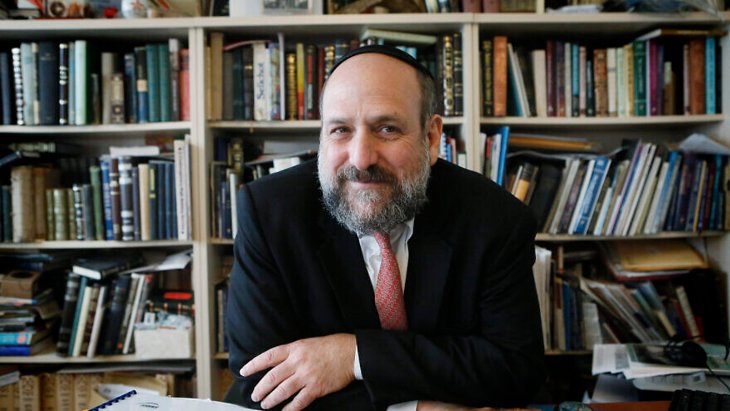

13 min read
Since 1989, thousands of Poles have discovered their Jewish roots and are free to pursue what it means to be a Jew.
The phone rings in Michael Schudrich’s study. The young man on the other end sounds upset. His grandmother died, and he needs the rabbi’s help.
Not so unusual, right? Except that, just before she died, this grandmother revealed something that shocked her family. It turns out they’re not Catholic after all. They’re Jews.
“Sometimes, they tell me, ‘Grandma did some strange things,’” says the rabbi. Like lighting candles Friday nights, refusing to eat bread for a week in the spring and forbidding them to drink milk after a meat meal.
“A lot of Poles come to me reeling from a deathbed confession,” he says. “Many of them want to connect to a Jewish part of themselves they never knew existed, but they have no idea where to begin.”
The numbers of new-to-you Jews is substantially up since 1989, when communism collapsed in Poland and with it, the edict that religion – in particular, Judaism – was an enemy of the state. “From 1939 to 1989, a Jew could not feel safe in Poland,” says the rabbi. “But since then, thousands of Poles have discovered their Jewish roots because their parents and grandparents now do feel safe to reveal this secret to their families … and they, in turn, are free to pursue what it means to be a Jew.”
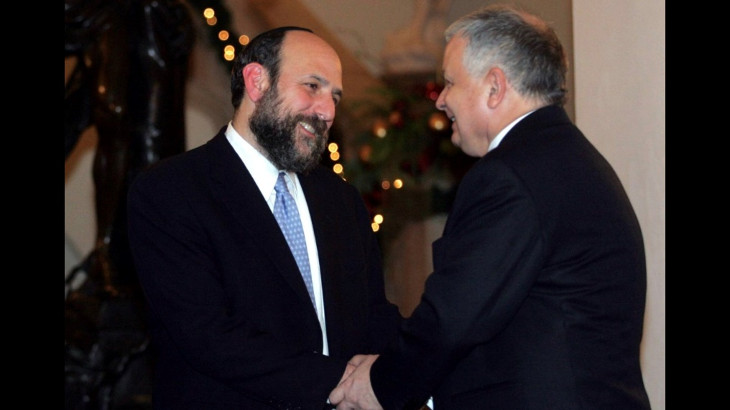 Chief Rabbi of Poland Michael Schudrich meets with late President Lech Kaczynski.
Chief Rabbi of Poland Michael Schudrich meets with late President Lech Kaczynski.
But welcoming freshly awakened Jews into the fold (a delicate and case-by-case process) is only a piece of the puzzle. As chief rabbi in a country that continues to live with a haunting past when it comes to its Jews – all six Nazi death camps were built in occupied Poland and hundreds of mass graves have been discovered, most of them awaiting preservation and markers, Schudrich is often called upon to rescue Jewish cemeteries from the bulldozer; handle issues of anti-Semitism when he sees it; and negotiate with the government over matters of religious freedom, such as the ritual kosher slaughtering of animals for consumption. Not to mention overseeing kashrut for restaurants, food manufacturers and exporters.
Today’s Jewish population – estimates swing wildly from 8,000 to 40,000 (depending who you ask and how you define being Jewish in Poland) – stands in sharp contrast to the 3.5 million Jews who called the Eastern European country home in 1939. At that time, Poland could boast the world’s largest concentration of Jews; six years later, nine out of 10 of them were dead. And most of the 350,000 survivors, often faced with less than welcoming neighbors, fled to Israel, the United States and other countries in the Diaspora.
“Today, it’s a small community struggling to reassert its Jewish identity while being responsible for preserving its glorious past,” says the rabbi.
“What’s amazing is his ability to time travel; he manages to be in two places at the same time,” says Agata Rakowiecka, director of the Jewish Community Center in Warsaw. She met the rabbi in 1990 when she was 6 and he taught a bunch of Jewish campers a new game called baseball.
“I liked him from the beginning – he was friendly and knew how to talk to a child,” she says. “And he remembered me each time we met.”
Now that they’re colleagues, Rakowiecka sees the rabbi as “our connecting point with the wider Jewish world and with Polish authorities. But what’s impressed me all these years,” she adds, “is his vision of the priorities of entire Jewish community beyond particular interests of various groups, his support of different kinds of Jewish belonging.”
"Only someone who truly believes they can do the impossible could be the main architect of the rebirth of Jewish life in Poland.”
Indeed, for most of his 64 years, Schudrich has focused his considerable energies on representing and serving all the Jews of Poland – the living and the dead – as both a leader who is no stranger to trick negotiations and as a spiritual guide doggedly determined to revitalize the Jews as individuals, families and community.
“Only an optimist can do that job,” says Jonathan Ornstein, executive director of the Krakow JCC. “Only someone who truly believes they can do the impossible could be the main architect of the rebirth of Jewish life in Poland.”
Or, as Schudrich likes to say, “Nothing is impossible.”
So how exactly did a kid from New York, weaned on the Mets and Cocoa Krispies (not soccer and perogies) become a Polish citizen and the chief rabbi of the entire country?
It has been a circuitous journey that’s taken the man around the world, but always back to his adopted home.
Born in 1955, Schudrich grew up with a Conservative rabbi father, a schoolteacher mother, two little brothers and a little sister. He studied religion at SUNY Stony Brook on Long Island, N.Y., before heading to the Jewish Theological Seminary in Manhattan for rabbinical school, followed by a master’s in history from Columbia University.
But it was as an 18-year-old that Schudrich first set foot on Polish soil, determined to bring Judaism (and smuggled prayer books, Torah commentaries and an Encyclopedia Judaica) to Jews starving for it in the Communist-controlled 1970s.
He returned again and again, joining forces with the Jewish Flying University, where people gathered secretly “to study whatever the government didn’t want them to,” recalls Konstanty Gebert, a Polish journalist and Jewish activist who met Schudrich back then. “He was already serious about empowering Poland’s Jews to be Jewish.”
“I was challenged by the fact that the only difference between me and these young Jews was that my grandparents left while theirs stayed,” says the rabbi. “I’d been given this tremendous Jewish education and wanted to share it, to level the playing field and to give something back.”
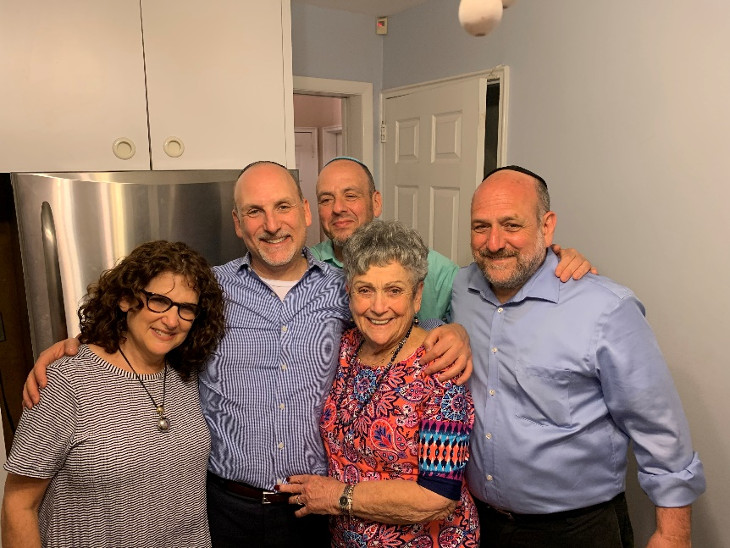 Chief Rabbi of Poland Michael Schudrich with his mother and siblings.
Chief Rabbi of Poland Michael Schudrich with his mother and siblings.
After graduating from JTS, the rabbi headed to Japan, where for six years, he served as chief rabbi to a community of a few hundred, mostly tourists, professionals and post-army-duty Israelis.
But he met someone in 1990 who would point him to his life’s purpose: Ronald S. Lauder, whose foundation was heavily invested in rescuing the Jews of Poland and their history – of not letting the world forget. “Ronald is the one who got me here,” he says 29 years later. “Without him, I don’t know if we could have accomplished a fraction of what we have.”
Representing Lauder, the rabbi returned to Poland in 1990 after the fall of communism, and beginning in 2000 (after returning to the States to pick up a second rabbinical ordination from the Rabbi Isaac Elchanan Theological Seminary at Yeshiva University), he served as the rabbi of Warsaw and Lodz. In 2004, he accepted the job of Poland’s chief rabbi.
This was a time when the door was just starting to creak open for a revitalization of Jewish life – one Jew and one family at a time. “We were beginning to hear from parents who had kept their Jewishness a deep dark secret for years,” he said, “not even telling their own children.”
The number of Poles who have discovered their Jewish roots is now in the thousands, and continues to mount.
Kasha Ornstein was 25 when her sister Marta discovered documents showing their father and much of their mother’s family were Jewish. Curious, Marta began attending study groups with the rabbi and invited her sister to a Hanukkah party, where she met her future husband. “Before, everything was hidden from us, but now we wanted to be part of the Jewish community,” says Kasha. After completing her conversion, she was married by the rabbi and is now a kosher caterer in Warsaw preparing weekly communal Shabbat dinners.
Today, Polish Jews have 10 active communities to connect to: the bigger ones offering daily services, the smaller ones weekly or holiday ones. In Warsaw, there’s a kollel for Torah and Talmud study, a Lauder-supported Jewish day school, a teen youth group, and active Hillels there and in Krakow. Locals also can find kosher meat, and there’s a kosher food pantry for the needy, including righteous gentiles who rescued Jews during the Shoah.
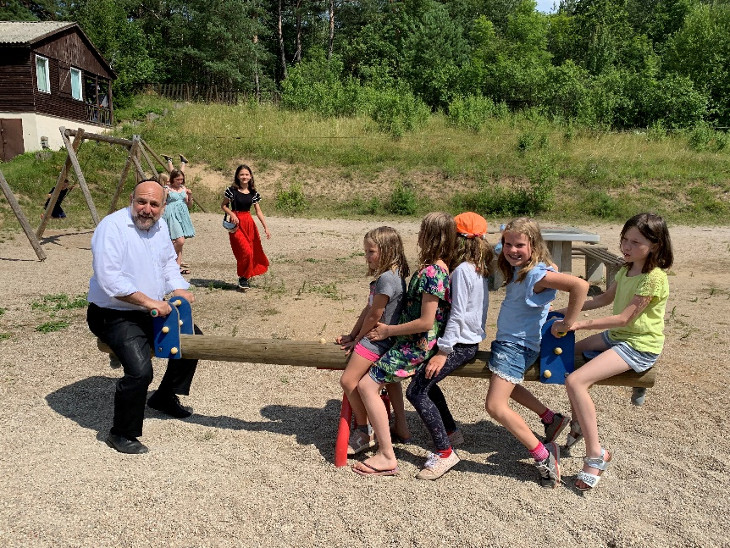 The rabbi with children at Poland’s Camp ATID.
The rabbi with children at Poland’s Camp ATID.
For the chief rabbi, nothing is typical except a 13-14 hour workday. A given week might find him counseling those who have recently discovered their Jewish roots. Many of them are hungry to learn everything Jewish – the holidays, prayers, Torah readings; how to keep Shabbat and kashrut; the ins and outs of conversion for those with Jewish fathers. Others want to take it more slowly. “I’ve learned never to push,” he says. “I look to them to guide me to what they need from me now.”
Schudrich may also find himself helping a restaurateur or food manufacturer/packager looking to make their products kosher. He’s also likely to speak at ceremonies rededicating a restored Jewish cemetery, erecting a memorial or commemorating the date of a community’s deportation of its Jews. Meetings abound with officials over protecting Jewish remains from the bulldozer, with the Israel ambassador about responding to a recent anti-Semitic act, with church leaders on interfaith matters and groups of visitors – some 200,000 arrive annually from Israel alone. And he spent one recent evening helping lead a memorial service for those murdered last October in Pittsburgh.
And always on the rabbi’s mind: Poland’s 1,400 Jewish cemeteries – many in varying states of disrepair – and mass graves still being discovered when a pile of human bones mysteriously surfaces at construction sites or playgrounds and parks. Or when an elderly Pole reveals that before he dies, he wants it known that Jews were buried in a certain place. “We need to pay tribute to them,” says the rabbi, “and make sure that their remains are respected and protected.”
But he acknowledges that he can’t do it all. “Whatever we possibly can do to preserve and mark them, we will, though we know the full task is beyond our capabilities,” he says. “As Rabbi Tarfon taught: ‘It is not your duty to finish the work, but neither are you at liberty to neglect it.”
“I’ve seen him go to incredible pains to ensure that nothing happens to the remains,” says Rabbi Andrew Baker, director of international Jewish affairs for the American Jewish Committee. “He has a strong sense of reverence, for both the living and the dead.”
No one can argue that Poland doesn’t have a complex history when it comes to its Jews, so the role of the chief rabbi here carries with it much of that complexity, much of that pain.
“The signs of the Holocaust are all around us; no one can forget,” says Secretary of State Wojciech Kolarski. “Poland became a cemetery after the German Nazis conquered it and built on Polish soil a machine to murder millions of Jews from around Europe.” He maintains that contemporary Poles are “fully aware of what happened here during those six years, and Poland makes an enormous effort to honor Jewish life and to provide lessons for generations to come.”
Yes, Kolarski concedes, there are Poles who have not learned these lessons. “Anti-Semitism is unfortunately present in various societies, and, of course, in Poland also,” he states. “And every incident has to be condemned and punished.”
Recent incidents include a swastika and Jude Raus (“Jew, get out”) on the Warsaw offices of a liberal opposition movement, and a giant straw effigy of an Orthodox Jew burned last Easter in the town of Pruchnik, not to mention countless hate-filled Internet and social-media postings.
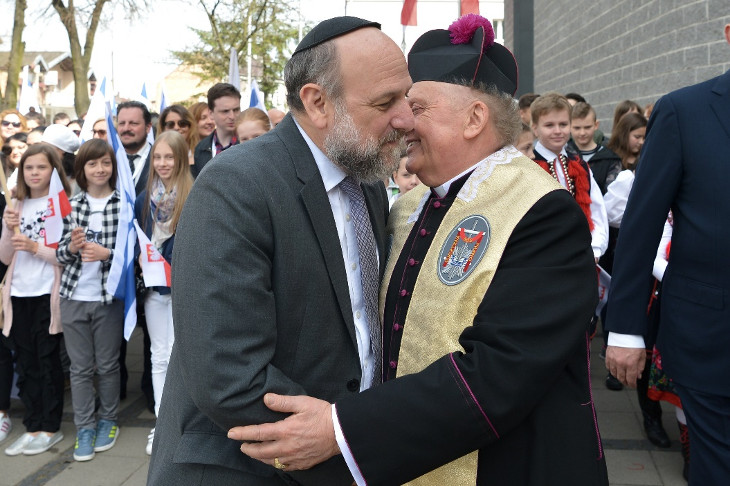 Chief Rabbi of Poland Michael Schudrich (left) seen during a March of the Living event ahead of Israel 70th Independence Day in the city of Plonsk, Poland, April 15, 2018. Photo by Yossi Zeliger.
Chief Rabbi of Poland Michael Schudrich (left) seen during a March of the Living event ahead of Israel 70th Independence Day in the city of Plonsk, Poland, April 15, 2018. Photo by Yossi Zeliger.
Particularly disturbing was Holocaust bill voted into law by the Polish parliament in late 2017, making it illegal to “falsely” accuse the Polish people or Polish state of any complicity in the crimes of the German Nazis, to the point of outlawing the term “Polish death camps” for those that Nazi Germany built and ran in Poland during World War II. Punishment included fines or a maximum three-year term in jail.
And here, too, the rabbi was cast as spokesman for an outraged Jewish world. "The law threatened to stifle serious academic research into the Holocaust,” notes Schudrich.
Worse still, he says, were comments made by several Polish leaders, including one who maintained that Jews wanted to go into the (Warsaw) ghetto. “My major concern was that some of the statements were clearly anti-Semitic – the kinds of things we hadn’t heard since the Holocaust,” said the rabbi. “My focus was making sure those statements would not go unresponded to.”
After months of international pushback, the government took the teeth out of the law by eliminating the punishment of fines and imprisonment.
The rabbi is known as a consummate peacemaker, attempting, whenever possible, to broker mutually acceptable resolutions – be they between the Jewish community and Polish officials, or disagreements between Jews.
“In a contentious time, with anti-Semitic rhetoric on the rise, including last year’s law dictating how we talk about the Holocaust and Poland, the rabbi is consistently sensitive to the concerns of both the Jewish and Polish communities,” says Andrew Srulevitch, director of European affairs for the Anti-Defamation League. “He’s always eager to see things from another’s point of view and how they can be worked out.”
“I’ve been given a chance to make a difference."
The rabbi credits this mindset to two of his greatest teachers: his father, Rabbi David Schudrich; and Rabbi Chaskel Besser, a Chassidic rabbi who fled Poland the day the Germans invaded in 1939 and made the shidduch between the young advocate and Lauder. “They taught me how to put all the people on one side and the problem on the other, so we can work together on creating a solution everyone can live with.”
And while he is certainly a peacemaker, he is also not afraid to call a spade a spade. “He refuses to see anti-Semites lurking under every bed,” says Gebert. “But he can be blunt and direct when it comes to confronting anti-Semitism when he sees it.”
So, when chairman of the Jewish Agency for Israel Isaac Herzog sent letters to Europe’s heads of state in the wake of the recent Yom Kippur attack at the synagogue in Halle, Germany, and Polish Prime Minister Mateusz Morawiecki answered with assurances that “Poland remains committed to combating all forms of anti-Semitism,” prompting Herzog to respond: “This is a very important statement by the Prime Minister of Poland, in every regard,” how did the rabbi react?
He wanted more than soothing words. “The statement is good, but needs to be followed with actions,” he said. “In fact, the prime minister has never met with Poland’s Jewish leaders.”
“I’ve been given a chance to make a difference,” Schudrich states. “To stand up for my people and help them come close to each other and their Jewish selves. So when a rabbi I met asked me, ‘How can you be here?’ I answered him, ‘How can I not?’”
Courtesy of JNS.org
